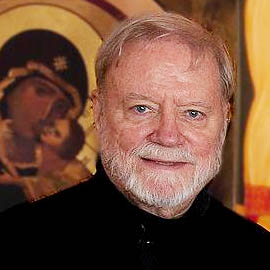Communion & Division – The Structure of Knowledge: Diminished Epistemology
23 October 2016Now, on the basis of the foregoing reflections about man’s knowledge of the true God, are there any directions indicated about what sorts of philosophy we should avoid? We do not have to respond to this question in full detail. Just a brief mention of certain schools of philosophy, with even the faintest recognition of what they hold, is sufficient grounds for discerning their incompatibility with the truth we know in Christ. For example, I submit that Christians should spontaneously reject postmodernism’s radical divorce of narrative from truth. And, apart from seminary professors, most Christians normally do.
Similarly, we would promptly repudiate Darwinian evolutionism, Marxist dialectical materialism, the naturalism of Bertrand Russell, the New Age anthropology of Carlos Casteñada, Aldous Huxley’s Western revival of Hindu monism, the utilitarianism of Jeremy Bentham, the pragmatism of John Dewey, the existentialism of Jean-Paul Sartre and Albert Camus, B. F. Skinner’s denial of freedom and dignity, the nihilism of Kafka and Ionesco, and so on. We can probably all think of Christians who have, from time to time, dabbled in such experiments, but we are justified in suspecting that philosophies like these will not be taken seriously by a sufficient number of ordinary Christians so as to undermine the gospel itself.
I do make bold to suggest, nonetheless, there are other, more serious philosophical approaches that can undermine the gospel, and I propose to mention three of them somewhat more at length. I do so because of an impression that these three kinds of philosophy have already, in fact, found a cozy home in the thinking of some Christians who are insufficiently critical of their implications. In the interest of charity toward some of those brethren from whom I am separated, I offer the following criticisms as my affirmation of “the differences we must sustain.”
 First, among the brands of philosophy against which divine revelation should put us on guard are those characterized by an overly restrictive and diminished epistemology. Much of contemporary philosophy is encumbered by two crushing and unnecessary burdens. The first burden is an excessive preoccupation with epistemic process, to the detriment of understanding. Philosophers have spent so much time and energy examining the motion and refining the shape of the hammer, so to speak, that they have apparently lost all interest in driving the nails. There is nothing more useless than a hammer with an inferiority complex. Step by step, modern man has now reached the end of that cul-de-sac down which he began wandering almost four centuries ago, becoming less and less concerned about what he knows and progressively more preoccupied with how he knows it.
First, among the brands of philosophy against which divine revelation should put us on guard are those characterized by an overly restrictive and diminished epistemology. Much of contemporary philosophy is encumbered by two crushing and unnecessary burdens. The first burden is an excessive preoccupation with epistemic process, to the detriment of understanding. Philosophers have spent so much time and energy examining the motion and refining the shape of the hammer, so to speak, that they have apparently lost all interest in driving the nails. There is nothing more useless than a hammer with an inferiority complex. Step by step, modern man has now reached the end of that cul-de-sac down which he began wandering almost four centuries ago, becoming less and less concerned about what he knows and progressively more preoccupied with how he knows it.
The second burden is what I will call modern epistemology’s reductionist impulse. Instead of inquiring, “How much can I know?”, contemporary man seems to be asking, “How little can I know?” This reductionist impulse has arrived at a severe and obvious crisis in recent years. The sustained, relentless application of doubt has just about run its course, and while it may be said that now there is nothing left to call into question, it also seems that there is nothing left to affirm.
We believers, who by divine revelation know God in faith, also realize that doubt is corrosive of faith. Now if doubt corrodes the highest and most secure form of knowledge, the knowledge of God, then doubt will most surely corrode every other and lower form of knowledge. A Christian will strongly suspect, then, that the cause of knowledge is not well served by ever-greater refinements of doubt.
I submit that the villain here is René Descartes, who commenced modern man’s tiresome epistemological journey by reducing the starting point of certainty to that famous line which he took to be an irrefutable inference, “Cogito, ergo sum.” Employing the processes of reason, which he also took to be irrefutable, Descartes then proceeded to build his entire philosophical edifice on that single foundation by which he had demonstrated his existence through reflection on his act of thought. He thus introduced into philosophy, as though it were a sort of theorem, the policy of systematic doubt, thereby arriving at an alleged irreducible nub of absolutely irrefragable truth. In his formula, “I think, therefore I am,” Descartes fancied that he had discovered the one certainty not subject to the corrosion of doubt.
Poor Descartes, who thought his foundational adage so secure. By contemporary standards, we recognize that in the art of doubt Descartes was a piker. Whereas he used reason to establish the existence of the self, it was not long before Hume would appeal to reason to cast doubt on the self, and Kant would soon enough employ reason to cast doubt on reason. And if any certainties were still left, Nietzsche came along to finish them off.
As a result, many of our contemporaries have foresworn the quest of truth, for which they have substituted a pursuit of “meaning.” Having proceeded from modern to postmodern, from Descartes to Derrida, philosophy now finds itself with nowhere else to go along the same path. It should be obvious at this late hour that relentless, systematic reductionist epistemology is already ending in utter solipsism and radical subjectivity.
Among some Christians, this substitution of subjective meaning for objective truth has already gone to seed. My counsel to such folk is to “get with” the gospel program and to place in the human mind that same level of confidence shown by the God who made the human mind. Indeed, they must start trying to love God with their whole mind, as we have been commanded. In other words, we Christians should stop worrying about the mule going blind, and start loading the wagon.
Patrick Henry Reardon is pastor of All Saints Antiochian Orthodox Church
in Chicago, Illinois.
He is the author of Christ in the Psalms, Christ in His Saints, and The Trial of Job.
He is a senior editor of Touchstone.







